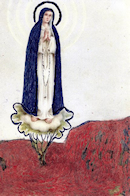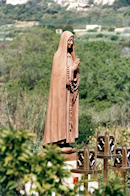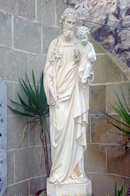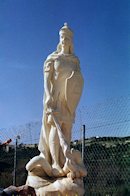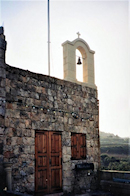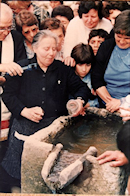
"Guza Mifsud was rather an unlettered woman, almost unable even to scrape a few words on pieces of paper... She used to scribble some words only she could understand. Nevertheless she had an extraordinary intelligence. Wherefrom such intelligence if not from Heaven and from Our Lady, whom she so much loved and most humbly served?"
Mgr. Amante Buontempo
Guza Mifsud - Her youth
WHO IS GUZA MIFSUD?
-
Often, Guza used to say, "Who am I? I am nobody. Nothingness is much better than me." However, all who knew her can justly claim that Guza was a brave woman, always ready to help others and determined to serve God in the mission he entrusted to her. She was always ready to fulfil God's will in everything, she offered herself as a victim for the conversion of sinners, her life was a continuous prayer for the needs of her brethren. Notwithstanding the difficulties she encountered, yet her face was always smiling, even in the most difficult moments, her smile, a sign of the peace she had in her heart, never faded. For the love of God, she quietly suffered both her illnesses and the injustices she received from her brethren and despite their behaviour, she kept praying for them. She used to say that she took pleasure in these injustices because she had further sufferings to offer for those persons who were withdrawn from God so that they change their lives and convert. Guza Mifsud, daughter of Isidoro and Nicolina nee Cassar, was born in Siggiewi, Malta, on January 27, 1923. She was the youngest of seven children, two of whom died very young.
She recalls her mother telling her, "Guza as soon as you were born I loved you so much even though I'd already had six other children. You were so frail we had to baptize you the day you were born. I can't figure out how you ever survived, as you were taking more medicine than food. Then at three months your aunt Ubaldesca and I took you to the Curia for confirmation"
Guza recounts as follows: "During my childhood we, of course, had our home at Siggiewi, but even so my family resided mostly in a farmhouse at Girgenti, in the limits of Siggiewi. I remember that when I was three years old or thereabouts, I would go on foot to the farmhouse with meals for the family who would be working in the fields. Then in the evening I would return to the village for catechism, especially as we were being prepared for Holy Communion. At night I would sleep at the house of my uncle and aunt, a bachelor and spinster, not to return to Girgenti before the following morning. I thank God for giving me the grace of receiving my first Holy Communion on July 19, 1931. That day my family were rather worried as my nose often bled profusely such that I even stained my clothes. I still remember the late Rev. Fr. Joseph Delia S.J., God rest his soul, testing the folk cure by placing huge doorkeys around my neck to try and stop the bleeding.
When I was eleven years of age, both my aunt and I contracted typhoid fever. I had it so bad that once again I was looking death in the face. Before being rushed to hospital, I received extreme unction. My family took turns visiting me. Once, on returning to the farmhouse, my father and brother had bad news. 'Kohn,' they told my mother, 'When you next visit Guza take a shroud with you. She is almost dead, with a raging fever of 105 or more.'
Leaving the farmhouse, my worried mother rushed to Rev. Fr. Guzepp Delia... and told him, 'Father Guzepp, I have bad news, Guza is dying. I wish you to say a mass for the dying so that she will have a good death.' At that time it was the custom to donate half a crown for a mass. My mother gave then shillings or a crown, but Fr. Delia told her, 'Keep the money. I'll say the mass just the same, but I assure you that Guza will not die.' His words proved prophetic. For three months I gambled with death, but the fever gradually subsided and my temperature returned to normal. I was taken to Imgieret for convalescence, and when I returned home I was fully recovered. In fact within a week or so I went up to Girgenti to help out with the farm work.
I can claim that my life, however, has never been a bed of roses. I have had ma fair share of thorns... setbacks, difficulties, trials. When I was eighteen, we moved house. Still in my prime, it was natural for me to try and have a beautiful house. I had sewn a few curtains and, after hearing Sunday Mass, I wanted to put them up. Before leaving for the farmhouse, my mother warned me against, 'You do not work today. It's a Sunday.' I replied that I had to, 'so that tomorrow I'll come up to the farmhouse to help.' Well, that day I was about to be handed another crown of thorns. I remember climbing this tall ladder with twenty-two rungs to put up the pelmet for the curtains... and I fell off. I don't know how I missed killing two neighbours' children who happened to be helping in the house. They shouted and shrieked and opened the door. Many people rushed to help, and somebody was putting whisky to my lips. My family at Girgenti were quickly informed, and my mother wept out loud, `Guza is unlucky, I'm sure she must be dead.' But they assured her it was not so. She arrived home in a horse-drawn cart and on reaching the front door she sobbed out loud, 'My daughter is dead, my daughter is dead.'
I had fractured my arm and my leg in two places. Tears streaming down her face, mother rushed to my bed and we wept together... My limbs were in plaster for four and a half months or so. I regularly visited the Hospital Out Patients' Department to check if the bones were healing properly. Jesus willed that after this tragedy all should end well. So once more I started helping my family. I also continued with my religious work — being a member of the Figlie di Maria, Catholic Action, delegate for the sick. Then with twelve other young women, I took charge of Adoration, 'the Lamp of Life'. My turn was Saturday so that during the rest of the week I could still give a helping hand to my family...
When I was about twenty-two years of age, I underwent an operation to have my appendix and gallstones removed. Although they took out my appendix, the gall stone was untouched and I can still feel it... A couple of days after the operation, they told me, 'It was a great night. While still under the anaesthetic you preached a most beautiful panegyric to Our Lady'. One of the nuns present told me, 'We kept sprinkling holy water, and even put St. Nicholas's bread under your mattress so you wouldn't break the stitches,' Nevertheless, that's exactly what I did — three stitches did break. No matter...
Even though my past had always been troublesome, I never admitted I was sickly or in pain. However, I now want to reveal all... My parents started worrying about me, apprehensive that when they passed away I would be left completely on my own. What follows was for me the cruellest crown of thorns. Once, mother approached me, 'Guza, there's a man who loves you so much. Why don't you pluck up courage and consent to marry him? It grieves me to leave you alone and unprovided for.' I told her, 'Mother, forget it, please do not mention such things to me. I am not cut out for marriage.'... Some time later there was someone else and my mother told me, 'Daughter, I would be extremely sad to leave you all alone with nobody to say a word to.' I could not help but tell my mother, 'Please, forgive me, but you're interfering with my wishes. I shall have to speak to my spiritual director about this.' And I in fact spoke to Rev. Fr. Gorg immediately. There were about another five likely lads who had their eyes on me, but I don't need to go into that...
As I said, I sought comfort and advice from Rev. Fr. Gorg... He took my complaints to heart and went straight to the farmhouse and told my family, 'Leave Guza alone. The Lord has entrusted her with a mission. Marriage is not for her. Please refrain from confusing her further; we cannot afford to disrupt her vocation.' From that day onwards, I thank the Lord and the Blessed Virgin that my family no longer insisted on marriage...
With regards to my past, I want to say that together with my two brothers I used to work in the fields. Before starting from our home in Siggiewi in order to go to Girgenti I used to make the sign of the Cross four times so that I would not have to cross myself again when I met people on the road. Then from home to 'Ta' Brija' cemetery I used to say five decades of the Rosary, from 'Ta' Brija' to the 'Troll' (bridge) I used to make visits to the Holy Sacrament, and beyond the Troll I meditated on the Way of the Cross, contemplating particularly on Christ's suffering. Whenever I met a car or carts on the way, even those of our neighbours, I never accepted a lift, preferring to suffer and pray along the route.
Much of our farming land was in Girgenti, but we also had a few fields in 'Ta' Zuta', known as 'lx-Xaghra'. I used to work there with my father, while mother would remain cooking inside the farmhouse. My father held the plough drawn by a cow, and I followed the furrow sowing potatoes or broad beans.
I remained under my mother's tutelage till the day she died... She raised us up in the fear of the Lord, and on Wednesday, Friday and Saturday we not only abstained from meat, but also from eggs, cheese and cheeselets. My dear mother who together with my father worked so hard to provide for us, fasted all through lent more than once or twice, notwithstanding all the suffering she went through. With regard to this I'll mention something else, not out of conceit, but in obedience to Our Lady so that as she says, 'someone's conscience may be touched and that someone will do likewise.' I'll say this for the greater glory of God and Our Lady of Life. Being poor we didn't have much but I used to deprive myself from most of the few things we had. I've already mentioned that I acted as delegate to the sick of the village and for example, when I visited them I gave them my share of the few goodies like the pie and the cheesecakes mother used to make. The sick, especially those whom nobody visited, thoroughly enjoyed the food I gave them and which I had denied myself."...
Further information may be obtained from the series of books entitled 'The Founding of a New Titular'.


